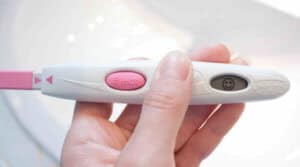An unplanned pregnancy is an issue that has preoccupied women for some time. With a child, life changes completely. Even with the large selection of the most modern contraceptive methods, an unplanned pregnancy cannot always be avoided.
There is still no contraceptive method that meets all the requirements for the ideal. Thus, there is no contraceptive method that simultaneously protects against sexually transmitted diseases, prevents pregnancy, and is free of side effects. Application errors are not the only reason why you can get pregnant unintentionally. The reliability of contraceptive methods can be measured. The Pearl Index indicates how many sexually active women, despite using the contraceptive method, have become pregnant unintentionally within one year. The Pearl index was named after the biologist Raymond Pearl.
To measure the Pearl index, the following formula is used: the total number of pregnant women who have used a particular contraceptive method is multiplied by 12. This value is divided by the product of the number of women and the number of methods used. The result is multiplied by 100. The lower the Pearl index, the safer it is.
However, this only measures in terms of contraception, but does not provide information on the safety of sexually transmitted diseases. The condom, for example, has a very high Pearl Index of 2-12 compared to other contraceptive methods, but is the only contraceptive that also protects against sexually transmitted diseases.
A study shows that every sixth woman has already become pregnant unintentionally. That is about 17% of women. If you include the women who want a child, but not at this time, it is already about 30% of unwanted pregnancies.
Table of contents
How Safe Are The Contraceptive Methods?
There are several criteria that should be considered when choosing a contraceptive method. In addition to the safety of the contraception and the protection against sexually transmitted diseases, one should also consider the age, the health aspects and the life and couple situation. Everyone can find the perfect contraceptive method for themselves.
It often happens that contraceptive methods are tried and later changed. Statistically, switching increases the risk of unwanted pregnancy. Therefore, you should be well informed before switching to avoid mistakes in using the new method.
It is also important to note that the Pearl index does not distinguish between contraceptive method failure, application errors and the resulting breakdown.
The Pearl Index Of Different Methods
Calendar method 9
Vaginal film 6
Contraceptive sponge 3-10
Chemical contraceptives 3-21
Coitus interruputus 4-18
Condom 2-12
Pessary 1-20
IUD 0.9-3
Temperature method 0.8-3
Contraceptive patch 0.72-0.9
Mini pill with levonorgestrel 0.5-3
Vaginal ring 0.4-0.65
Three-month injection 0.3-1.4
Hormonal IUD 0.16
Mini-pill with desogestrel 0.14-0.4
Pill 0.1-0.9
Copper chain 0.1-0.3
Also interesting:
- The 10 best tongue depressors
- The best sellers of pipe cleaners
- The 7 best drift trikes for children
Even sterilization is not 100% safe. The Pearl index of sterilization is 0.1, and for male sterilization, it is as high as 0.25. If you want to learn more about sterilization, read on here. https://www.practicalmommy.com/sterilisation-der-frau/
The pill is one of the most widely used contraceptives and provides very safe protection against pregnancy. The pill has no effect on a woman’s fertility even after long-term use. Its use is very simple and there are many different brands, which differ in the amount of dosage.
However, the pill is also a drug whose effect can be reduced by irregular intake or even gastrointestinal problems. Is it, therefore, possible that if you miss your period despite taking the pill, you are pregnant?
Missing Your Period: How The Pill Works
When the pill is taken, synthetic hormones are released into the female body. These have the effect of stopping egg maturation and preventing the production of uterine mucus into which the embryo implants. In addition, a thick layer of mucus is also created in the cervix through which the tiny male swimmers cannot penetrate. In a cycle of 21 or 24 days (can be more, depending on the type), the pill is taken continuously. After that, the intake is interrupted for several days. Hormonal bleeding now occurs due to the released hormones. The pill also works within the artificial period, i.e. continuously.
In most cases, this can even be very weak and only occur very lightly. After the break, the pill is taken again. The bleeding that occurs is not real menstruation, but an artificially triggered bleeding.
Some women also take the pill a few days longer than they should and can thus delay bleeding. This can be an explanation for why you miss your period. If you cannot rule out the possibility that you are not pregnant despite taking the pill, you should take a pregnancy test. If you do not have your period despite taking the pill, you should contact your gynecologist.
Pregnant Despite Taking The Pill And Having Periods
As long as women take the pill regularly, it works very safely. But if the pill is taken very irregularly, forgotten again and again, or if the woman suffers from gastrointestinal problems and has diarrhea or vomiting, the effect of the pill can even decrease.
If the woman has unprotected sexual intercourse during this time, the pill does not work properly. She may become pregnant despite taking the pill. If she continues to take the pill, the pill does its job.
Once the break of several days is taken, the hormonal period also occurs, even though the woman is pregnant and taking the pill. This is not a natural menstrual period, but one that is started by the pill. A pregnancy test can help provide clarity.
Pregnant Despite Pill And Period: Tips For Not Forgetting The Pill
Some pills can even be taken within 12 hours if they are forgotten without their effect diminishing. Check with your gynecologist to see if this is the case with your pill. Develop a set ritual so you don’t forget to take the pill.
For example, you can put the pill next to your toothbrush and take it right before you brush your teeth in the morning. Alternatively, you can activate a reminder on your smartphone. If you are not sure that the pill will work because you have been sick or have forgotten it more than once, you should play it safe with a condom as an alternative.
The Oldest Contraceptive: Coitus Interruptus
Coitus interruptus is one of the oldest contraceptive methods in the world. In this method, the man withdraws his penis from the woman’s vagina shortly before ejaculation. This offers small protection against pregnancy, but not against sexually transmitted diseases. Coitus interruptus was already described in the Bible and the Koran, making it one of the oldest contraceptive methods in the world. Even today, many people still use this contraceptive method. The man interrupts sexual intercourse with his partner in time to ejaculate outside the female body.
Uncertainty Factor Is The Rush Of Emotions
The man must be able to control himself and his body very well in order to end sexual intercourse at the right moment. Men and especially young men do not always succeed in this. Pregnancy can then be very likely, depending on the woman’s cycle.
But more often than assumed, couples use this method of contraception. Nearly 14% of women aged 15-30 from 35 different countries reported using coitus interruptus as a contraceptive method.
Coitus interruptus is suitable for couples who do not completely rule out the possibility of pregnancy and where the man is aware of his responsibility. Both partners should be well informed about the health condition of the other because sexually transmitted diseases are not uncommon with this contraceptive method.
Pleasure Drops
One often reads something about the lust drop in connection with coitus interruptus. The pleasure drop is a clear liquid that comes out shortly before the actual ejaculation. This clear fluid is produced by the Cowper’s gland. It flushes the urethra and serves as a natural lubricant. Up to 4 ml can come out during this pleasure drop.
To date, it has not been sufficiently scientifically proven whether the fluid contains sperm. Some older studies proved sperm in the desired drop, others did not. But whether the sperm is a real component of the lust drop or whether small amounts of previous or subsequent ejaculation got into the lust drop during the experiments has not been clarified.












